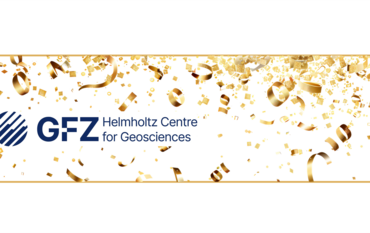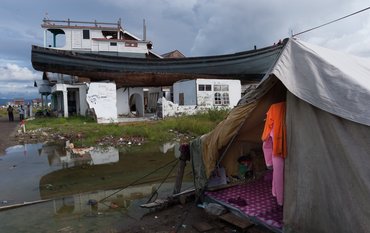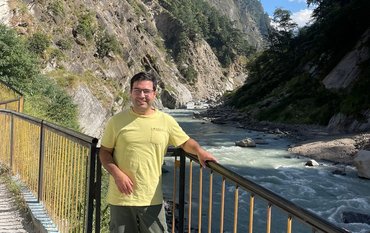René Steinmann and Jana Täumer started their research projects as new GFZ Discovery Fellows in January and March respectively. René Steinmann is researching ground vibrations in connection with animal movements and Jana Täumer is investigating methane sinks in Germany.
René Steinmann’s work utilizes seismic sensors - usually used to study geophysical phenomena such as earthquakes - to monitor ground vibrations related to animal movement in the African savanna. This approach aims to provide a non-invasive and continuous means of tracking habitat usage and undisturbed behavior of various species. The project addresses the challenges of human development, illegal poaching, and climate change by integrating seismic sensors into conservation programs. The project seeks to bridge the gap between seismology and animal biology, using advanced seismic data processing, machine learning, and newly collected field data to develop a robust methodology for ecological monitoring and the protection of endangered species. Additionally, the project seeks to explore the influence of the Anthropocene on the seismic wavefield and its potential implications for the well-being of animals. René Steinmann will conduct research in GFZ Section 2.6 Seismic Hazard and Risk Dynamics and will closely collaborate with GFZ Section 2.4 Seismology and the animal vibration lab at the University of Oxford.
René Steinmann accomplished his doctoral thesis on at the Université Grenoble Alpes in France in December 2022, where he worked on unsupervised machine learning methods to scan large seismic time series data for hidden signal patterns. Afterwards he visited the GFZ with a Helmholtz visiting researcher grant. During his research, René analyzed seismic vibrations coming from cities, fault zones and volcanoes, and now he will analyze seismic vibrations coming from terrestrial life.
As a new GFZ Discovery Fellow, Jana Täumer explores the soil methane sink in Germany. Soils are the only known biological methane sink, mediated by microorganisms that consume this powerful greenhouse gas (methanotrophs). Her project aims to provide valuable insights into mitigating climate change by leveraging the natural potential of these microbes by using environmental microbiome engineering. Furthermore, she seeks to approximate how methane uptake of soils may change due to climate change. The project includes laboratory incubations with different microorganisms and soils, simulating different climate change scenarios. Furthermore, she will elucidate the soil methane sink and the distribution of methane-consuming bacteria in Germany using a combination of field measurements, molecular techniques, and remote sensing approaches. Jana Täumer will research under GFZ Section 3.7 Geomicrobiology in collaboration with Section 1.4 Remote Sensing and Geoinformatics.
Jana Täumer completed her doctoral thesis at the Institute of Microbiology at the University of Greifswald, during which she studied the methane cycle in soil and the associated biotic and abiotic factors. She then researched microbial methane uptake and methane release in forest soils and how they are altered due to climate change at Arizona State University.
The Fellowships of the GFZ Discovery Fund run for up to three years and support particularly innovative projects that identify future research fields within the GFZ research groups. The research topic can be chosen freely, but must be assigned to one of the GFZ's research groups in the fourth funding period of the Helmholtz Association's programme-oriented funding POF IV, as well as being interdisciplinary in nature and carried out in close cooperation with at least two GFZ sections.


![[Translate to English:] René Steinmann and Jana Täumer](/fileadmin/_processed_/d/e/csm_20240415_Discovery-Fellows_bfeb1bccef.jpeg)





![[Translate to English:] Fire in a forest, smoke rising, aerial view from above](/fileadmin/_processed_/8/3/csm_2025_01_06_AdobeStock_415831729_5a0e6d50d3.jpeg)









![[Translate to English:] [Translate to English:] Abror Gafurov von dem Schriftzug "Welcome to Azerbaijan" und den UN und COP Logos](/fileadmin/_processed_/2/5/csm_2024_11_Baku_COP29_Abror_Gafurov_1042faec82.jpeg)


![[Translate to English:] Martin Herold standing in front of the library on the Telegrafenberg](/fileadmin/_processed_/c/d/csm_Martin_Herold_d385ee4dd9.jpeg)
![[Translate to English:] Many people are listening to a presentation in the GFZ lecture hall.](/fileadmin/_processed_/c/a/csm_1_Bild1_hell_b9c0e9f5ed.jpeg)






![[Translate to English:] Both scientists sitting on stools in front of a wall of books in the Telegrafenberg library](/fileadmin/_processed_/6/6/csm_Buiter_Castell_DORA_4_e87cb1ea18.jpeg)
![[Translate to English:] Gruppenbild mit 4 Personen](/fileadmin/_processed_/8/d/csm_20241017_GFZ-Emmerman-Medal-005_web_reinhardtundsommer_21a414fa4a.jpeg)






![[Translate to English:] Ice landscape with five red tents](/fileadmin/_processed_/8/9/csm_Zeltlager_auf_dem_Eis_Urheberin_Jenine_McCutcheon_5ced2d523b.jpeg)